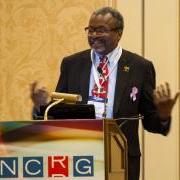NCRG Conference: Recovery-oriented Systems Of Care – A National Perspective

To understand the big picture of what constitutes a recovery from a gambling disorder, it is best to look at it from both national and local perspectives. The 13th annual NCRG Conference on Gambling and Addiction kicked off Tuesday morning with a presentation from H. Westley Clark, M.D., J.D., M.P.H., director of the Center for Substance Abuse Treatment (CSAT) in the Substance Abuse and Mental Health Services Administration (SAMHSA). SAMHSA’s mission is to reduce the impact of substance abuse and mental illness in America’s communities.
During the session, Dr. Clark explained SAMHSA’s priority of fostering and developing recovery-oriented systems of care (ROSC). ROSC provides a coordinated network of community-based services and supports that is focused on the individual’s needs. It builds on the strengths and resilience of families and communities to achieve abstinence and improved health, wellness and quality of life for those at risk of developing alcohol and drug problems or other addictions. Dr. Clark noted that ROSC is already being successfully integrated into many treatment programs for gambling disorders.
Dr. Clark noted several benefits of ROSC, such that it does the following.
- ROSC addresses quality of life issues through a holistic approach decreases the risk of relapse and increases the chances for a successful recovery for pathological gamblers.
- The system Includes recovery support services in conjunction with clinical treatment help to establish a more continuous treatment response.
- ROSC focuses on reducing the acute and severe relapses that pathological gambling clients often experience.
He noted that implementation of ROSC continues to evolve and the passage of health care reform will allow for additional support of ROSC programs.
A part of a successful ROSC program is to distribute information to the individual in innovative ways. Dr. Clark discussed that providers are beginning to encourage patients to use health apps for assistance in treat conditions and promoting general wellness. These apps offer health-related services for smartphones, tablets or PCs and can be used for self-monitoring or in collaboration with treatment providers.
Examples of these apps are:
- Overcoming Gambling Addiction by KoolAppz: This is a written education tool with chapters on relevant topics, including gambling addiction, symptoms of a gambling addiction, phases of gambling addiction, who is a gambling addict and how to stop gambling.
- Gambling Addiction Help: This app includes a set of audios that patients can listen to in times of need to help them control their urges, impulses, emotions and thoughts.
Additionally, Dr. Clark said that SAMHSA has created and is currently testing a smartphone-based recovery tool the Addiction Comprehensive Health Enhancement Support System (A-Chess). This app will feature online peer support groups, clinical counselors, a GPS feature that sends an alert when the user is near an area of previous drug or alcohol activity, real-time video counseling and a “panic button” that will allow users to place an immediate call for help.
Dr. Clark concluded the session by stating that there still is a lot to be done in this area, including: developing the workforce, developing core principles of effective treatment and improve public perception.
What do you think about ROSC programs and SAMHSA placing it as a top priority? Treatment providers, how does that translate to your practice? Please leave your comments in the section below.
NCRG staffConference on Gambling and AddictionConferencecontinuing educationgambling disordersNCRGrecoverySAMHSA

